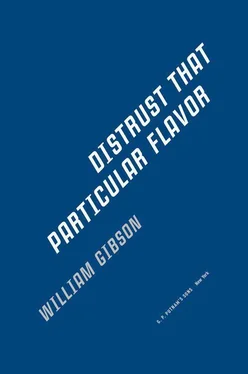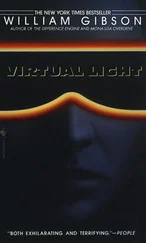The Internet, an unprecedented driver of change, was a complete accident, and that seems more often the way of things. The Internet is the result of the unlikely marriage of a DARPA project and the nascent industry of desktop computing. Had nations better understood the potential of the Internet, I suspect they might well have strangled it in its cradle. Emergent technology is, by its very nature, out of control, and leads to unpredictable outcomes.
As indeed does the emergent realm of the digital. I prefer to view this not as the advent of some new and extraordinary weirdness, but as part of the ongoing manifestation of some very ancient and extraordinary weirdness: our gradual spinning of a sort of extended prosthetic mass nervous-system, out of some urge that was present around the cooking fires of our earliest human ancestors.
We call film “film” today in much the same way we “dial” phones, the actual dials being long gone. The fact that we do still employ actual film, in the traditional sense, seems an artifact of platform transition and industrial economics. I tend to take arguments for the innate esthetic superiority of “film” with the same grain of salt I reserve for arguments for the innate esthetic superiority of vinyl. Whatever the current shortcomings of the digital image, I imagine there will be digital ways around them.
But I need to diverge here into another industry, one that’s already and even more fully feeling the historical impact of the digital: music. Prior to the technology of audio recording, there was relatively little one could do to make serious money with music. Musicians could perform for money, and the printing press had given rise to an industry in sheet music, but great fame, and wealth, tended to be a matter of patronage. The medium of the commercial audio recording changed that, and created an industry predicated on an inherent technological monopoly of the means of production. Ordinary citizens could neither make nor manufacture audio recordings. That monopoly has now ended. Some futurists, looking at the individual musician’s role in the realm of the digital, have suggested that we are in fact heading for a new version of the previous situation, one in which patronage (likely corporate, and nonprofit) will eventually become a musician’s only potential ticket to relative fame and wealth. The window, then, in which one could become the Beatles, occupy that sort of market position, is seen to have been technologically determined. And technologically finite. The means of production, reproduction, and distribution of recorded music are today entirely digital, and thus are in the hands of whoever might desire them. We get them for free, often without asking for them, as inbuilt peripherals. I bring music up, here, and the impact the digital is having on it, mainly as an example of the unpredictable nature of technologically driven change. It may well be that the digital will eventually negate the underlying business model of popular musical stardom entirely. If this happens, it will be a change which absolutely no one intended, and few anticipated, and not the result of any one emergent technology, but of a complex interaction among several. You can see the difference if you compare the music industry’s initial outcry against “home taping” with the situation today.
Whatever changes will come for film will be as unpredictable and as ongoing, but issues of intellectual property and piracy may ultimately be the least of them. The music industry’s product is, for want of a better way to put it, a relatively simple, relatively traditional product. Audio recordings just aren’t that technology-heavy. Though there’s one aspect of the digital’s impact on music that’s absolutely central to film: sampling. Sampling music is possible because the end consumer of the product is now in possession of technologies equal or even superior to the technologies involved in producing that product. Human capital (that is, talent) aside, all the end-consumer-slash-creator lacks today, in comparison to a music-marketing conglomerate, is the funds required to promote product. The business of popular music, today, is now, in some peculiarly new way, entirely about promotion.
Film, I imagine, is in for a different sort of ride up the timeline, primarily owing to the technology-intensive nature of today’s product. Terminator III Unplugged is a contradiction in terms. Hollywood is massively and multiply plugged, and is itself a driver of new technologies. The monopoly on the means of production (at least in terms of creation) can be preserved, in this environment, as the industry itself operates on something very near the cutting edge of emergent technology. For a while, at least.
In terms of the future, however, the history of recorded music suggests that any film made today is being launched up the timeline toward end-user technologies ultimately more intelligent, more capable, than the technologies employed in the creation of that film.
Which is to say that, no matter who you are, nor how pure your artistic intentions, nor what your budget was, your product, somewhere up the line, will eventually find itself at the mercy of people whose ordinary civilian computational capacity outstrips anything anyone has access to today.
Remember the debate around the ethics of colorizing films shot in black and white? Colorization, up the line, is a preference setting. Probably the default setting, as shipped from the factory.
I imagine that one of the things our great-grandchildren will find quaintest about us is how we had all these different, function-specific devices. Their fridges will remind them of appointments and the trunks of their cars will, if need be, keep the groceries from thawing. The environment itself will be smart, rather than various function-specific nodes scattered through it. Genuinely ubiquitous computing spreads like warm Vaseline. Genuinely evolved interfaces are transparent, so transparent as to be invisible.
This spreading, melting, flowing together of what once were distinct and separate media, that’s where I imagine we’re headed. Any linear narrative film, for instance, can serve as the armature for what we would think of as a virtual reality, but which Johnny X, eight-year-old end-point consumer, up the line, thinks of as how he looks at stuff. If he discovers, say, Steve McQueen in The Great Escape , he might idly pause to allow his avatar a freestyle Hong Kong kick-fest with the German guards in the prison camp. Just because he can. Because he’s always been able to. He doesn’t think about these things. He probably doesn’t fully understand that that hasn’t always been possible. He doesn’t know that you weren’t always able to explore the sets virtually, see them from any angle, or that you couldn’t open doors and enter rooms that never actually appeared in the original film.
Or maybe, if his attention span wavers, he’ll opt to experience the film as if shot from the POV of that baseball that McQueen keeps tossing.
Somewhere in the countless preferences in Johnny’s system, there’s one that puts high-rez, highly expressive dog heads on all of the characters. He doesn’t know that this setting is based on a once-popular Edwardian folk motif of poker-playing dogs, but that’s okay; he’s not a history professor, and if he needed to know, the system would tell him. You get complete breed selection, too, with the dog-head setting, but that was all something he enjoyed more when he was still a little kid.
But later in the afternoon he’s run across something called The Hours , and he’s not much into it at all, but then he wonders how these women would look if he put the dog heads on them. And actually it’s pretty good, then, with the dog heads on, so then he opts for the freestyle Hong Kong kick-fest….
Читать дальше










